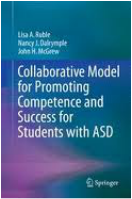Welcome to the Autism Services Research Group

We seek to advance research that improves the quality of life of children, youth, and adults with autism spectrum disorders (ASD). To improve outcomes, understanding the whole person is essential and collaboration between parents and caregivers, family members, teachers, and therapists is vital.
Our research involves the development and testing of interventions and the study of services and outcomes of interventions. We emphasize research that has direct implications for community based services, the shortage of trained professionals, and the need for interventions that have positive effects for all children using personalized treatment planning.
Read the article published in the Herald Leader on 10/19/14.
NIH Press Release: Pilot Research on Services for Transition-Age Youth Improving Transition Outcomes in ASD using COMPASS
We have received funding for a new research project to study the Collaborative Model for Promoting Competence and Success (COMPASS) as an implementation strategy for preventing lapses in services and enhancing functional life outcomes among transition-age youth with ASD. COMPASS is a parent-teacher consultation intervention which is designed to assist public school special educators and parents in person-centered decision-making for individualizing evidence-based interventions for children with ASD.
With funding from NIMH, we have completed two randomized controlled studies of the effectiveness of COMPASS. COMPASS puts into practice the importance of collaborative decision-making between parents and professionals, the necessity of understanding how ASD affects each person individually and how personal and environmental strengths are considered to offset challenges, and how ongoing data-based decision making is applied to ensure optimal outcomes.
We have published our COMPASS manual with Springer. The manual details the exact methods and protocols to develop, implement, and monitor outcomes of children with autism. It is developed for specialists who provide consultation and support to classroom teachers.
To find out more about how COMPASS informs our clinical training program in School Psychology, click here.
Our research involves the development and testing of interventions and the study of services and outcomes of interventions. We emphasize research that has direct implications for community based services, the shortage of trained professionals, and the need for interventions that have positive effects for all children using personalized treatment planning.
Read the article published in the Herald Leader on 10/19/14.
NIH Press Release: Pilot Research on Services for Transition-Age Youth Improving Transition Outcomes in ASD using COMPASS
We have received funding for a new research project to study the Collaborative Model for Promoting Competence and Success (COMPASS) as an implementation strategy for preventing lapses in services and enhancing functional life outcomes among transition-age youth with ASD. COMPASS is a parent-teacher consultation intervention which is designed to assist public school special educators and parents in person-centered decision-making for individualizing evidence-based interventions for children with ASD.
With funding from NIMH, we have completed two randomized controlled studies of the effectiveness of COMPASS. COMPASS puts into practice the importance of collaborative decision-making between parents and professionals, the necessity of understanding how ASD affects each person individually and how personal and environmental strengths are considered to offset challenges, and how ongoing data-based decision making is applied to ensure optimal outcomes.
We have published our COMPASS manual with Springer. The manual details the exact methods and protocols to develop, implement, and monitor outcomes of children with autism. It is developed for specialists who provide consultation and support to classroom teachers.
To find out more about how COMPASS informs our clinical training program in School Psychology, click here.

